Key Moments Of The 2024 General Election Campaign
Rishi Sunak announced the General Election in the pouring rain on 22 May (Alamy)
6 min read
It has been six weeks since Prime Minister Rishi Sunak called a snap General Election to be held on 4 July, to the surprise of even those in his own party.
In the weeks since, the Conservatives have tried to narrow the polling gap between them and Labour. Keir Starmer's party has maintained large, double-digit leads over the Tories since Liz Truss's premiership in 2022, suggesting that the MP for Holborn and St Pancras is likely to become the first Labour leader to win a general election since Tony Blair in 2005.
Here are the key moments from throughout the General Election campaign:
22 May
Rishi Sunak delivered a speech in the pouring rain on Downing Street, in which he announced the General Election would be held on 4 July – despite having previously told Conservative MPs – including ministers – that they could book their summer holidays in anticipation of a probable autumn election.
24 May
A couple of days into the campaign, former Labour leader Jeremy Corbyn confirmed he would run as an independent candidate in Islington North, having been suspended from Labour in 2020 over his response to a report into anti-Semitism in the party.
25 May
Sunak announced that the Conservatives would bring in compulsory National Service for every 18-year-old if they won the election, which would involve either a military commission or one weekend a month volunteering in “civil resilience”.
According to a YouGov poll, young Brits opposed the plans by 65 per cent to 27 per cent, while people aged over 65 backed it by 63 per cent to 31 per cent.
28 May
The Labour Party restored the whip to Diane Abbott so she could run for Labour in Hackney North and Stoke Newington, but only after some senior Labour figures said they were unhappy with how she had been treated by the party. She had lost the whip in 2023 after writing that Irish people, Jewish people and Travellers do not experience racism "all their lives" in the same way Black people do.
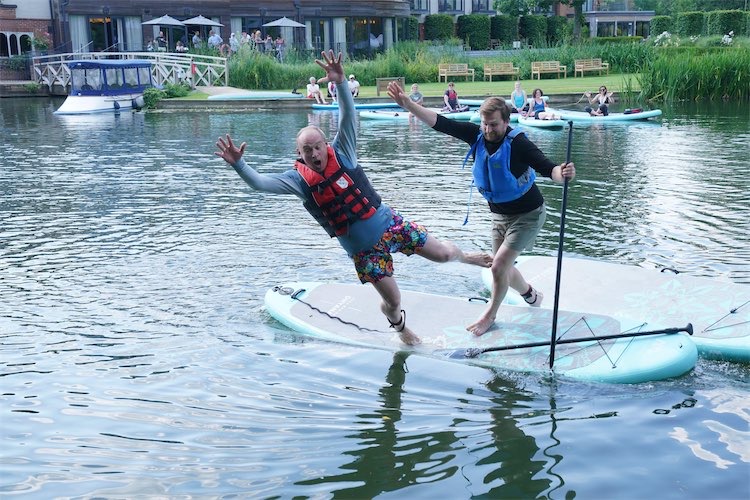 Ed Davey has been involved in several stunts throughout the campaign (Alamy)
Ed Davey has been involved in several stunts throughout the campaign (Alamy)
Liberal Democrat leader Ed Davey performed his first notable stunt of the campaign, in which he fell off a paddleboard in Lake Windermere in front of TV cameras. The stunt was to demonstrate the ongoing sewage spill crisis, with the Lib Dems outlining plans to tackle it.
Davey has continued to carry out stunts throughout the campaign, including going down a slip ‘n slide in an inflatable ring, and later did a bungee jump.
On this date, the Conservatives announced a pledge to introduce a 'Triple Lock Plus' on pensions which would raise the tax-free pension allowance – in what was widely seen as another move to appease their older voter base.
3 June
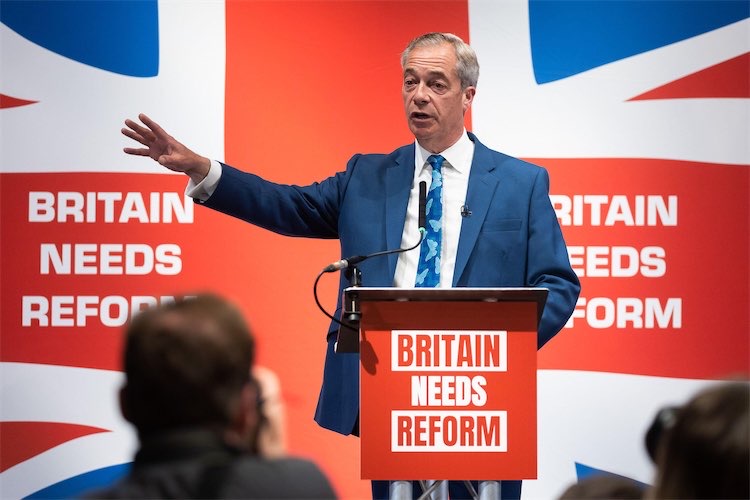 Nigel Farage delivered a speech at a press conference to announce he would stand as a Reform UK candidate (Alamy)
Nigel Farage delivered a speech at a press conference to announce he would stand as a Reform UK candidate (Alamy)
Nigel Farage announced that he would take over as leader of Reform UK and also run for the party in Clacton, which is being defended by Conservative candidate Giles Watling.
Farage had previously ruled out standing in the election, but said he had changed his mind as he felt he would be letting "millions" of voters down if he did not. Since this announcement, Reform has climbed in the polls significantly: having started the campaign on an average of 11 per cent of national vote share in the polls, it has since increased to an average of around 16 per cent.
4 June
ITV hosted the first head-to-head leader debate between Sunak and Starmer, in which the Labour leader pressed Sunak on his support for his predecessor Liz Truss and the Prime Minister repeated the line that Labour would increase taxes by £2,000 if they get into government, a figure that is highly-contested.
Elsewhere on this day, a 25-year-old woman threw a milkshake over Farage on his first day campaigning in Clacton.
6 June
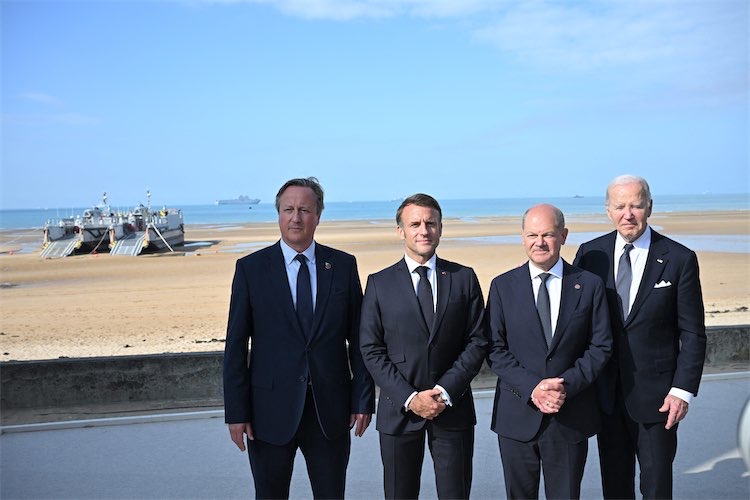 Lord David Cameron with French President Emmanuel Macron, German Chancellor Olaf Scholz, and US President Joe Biden at the D-Day commemorations in Normandy (Alamy)
Lord David Cameron with French President Emmanuel Macron, German Chancellor Olaf Scholz, and US President Joe Biden at the D-Day commemorations in Normandy (Alamy)
Rishi Sunak left a major D-Day commemoration event in Normandy early in order to record a TV interview for the following week, leaving Foreign Secretary Lord David Cameron to be pictured with other world leaders in his place.
He later admitted he had made a "mistake" by doing so, after being criticised by furious Tories for the decision.
7 June
The BBC hosted the first seven-way leaders debate, with Leader of the Commons Penny Mordaunt standing in for Sunak and Labour's deputy leader Angela Rayner taking Starmer's place. Mordaunt was attacked from all sides by the other major parties after she said Sunak had been "completely wrong" to leave the D-Day commemoration early.
11 June
The Conservatives launched their election manifesto, including some previous pledges such as a new National Service for teenagers. The main new policy was a promise to abolish the main rate of National Insurance for the self-employed, which Sunak hoped would boost the party's tax-cutting credentials.
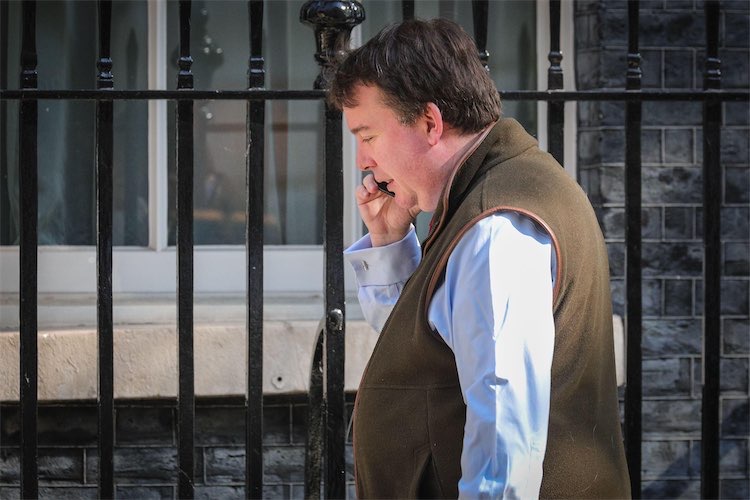 Craig Williams has been Parliamentary Private Secretary (PPS) to Rishi Sunak since October 2022 (Alamy)
Craig Williams has been Parliamentary Private Secretary (PPS) to Rishi Sunak since October 2022 (Alamy)
On the same date, The Guardian reported that Sunak's parliamentary private secretary and close ally, Craig Williams, had placed a bet on the date of the general election only days before it was announced, and was therefore being investigated by the Gambling Commission.
It later emerged that multiple Tories, including the party's director of campaigning, Tony Lee, and his wife, the Conservative candidate for Bristol North West, were also being investigated on similar allegations.
13 June
Labour launched their election manifesto, which setting out their vision on achieving economic growth, while also promising to cut crime, reduce NHS waiting lists, liberalise planning rules and improve the UK’s energy security. The document didn't contain any major new policy announcements.
20 June
The head of campaigning for the Conservative Party, Tony Lee, took a leave of absence due to the investigation over his and his wife's alleged bets, with only two weeks still to go until polling day.
25 June
The Conservatives withdraw support from their candidates involved in the betting scandal, including Williams.
Later that day, the Labour Party also confirmed they had withdrawn support for Kevin Craig, their candidate for Central Suffolk and North Ipswich, after it emerged he was being investigated for placing a bet on the outcome of his own constituency. He reportedly placed a bet on himself losing the seat.
27 June
A undercover Channel 4 investigation revealed that people canvassing for Reform UK in Clacton had made racist and homophobic comments, including towards Rishi Sunak.
Sunak responded by saying he was "hurt and angry" at the term used about him, and Nigel Farage said the party was "not perfect" but that the comments were "not reflective" of the party.
2 July
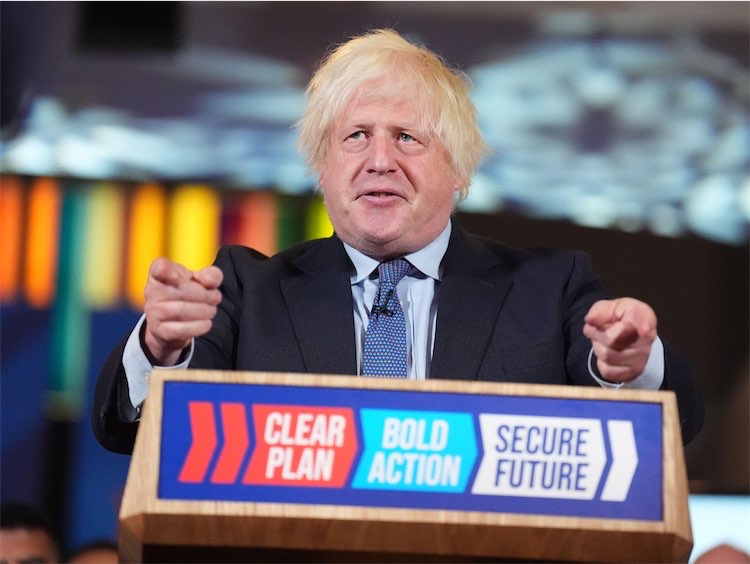 Boris Johnson made a surprise appearance at a Tory rally event (Alamy)
Boris Johnson made a surprise appearance at a Tory rally event (Alamy)
Former prime minister Boris Johnson made his only appearance of the campaign at a party rally in Chelsea. He accused Starmer of trying to “usher in the most leftwing Labour government since the war”, claiming Labour would increase taxes and fail to stand up to Vladimir Putin if they get into power.
4 July
Voters across the UK will head to the polls, with exit poll expected at around 10pm before final results from across the country are announced throughout the night.
